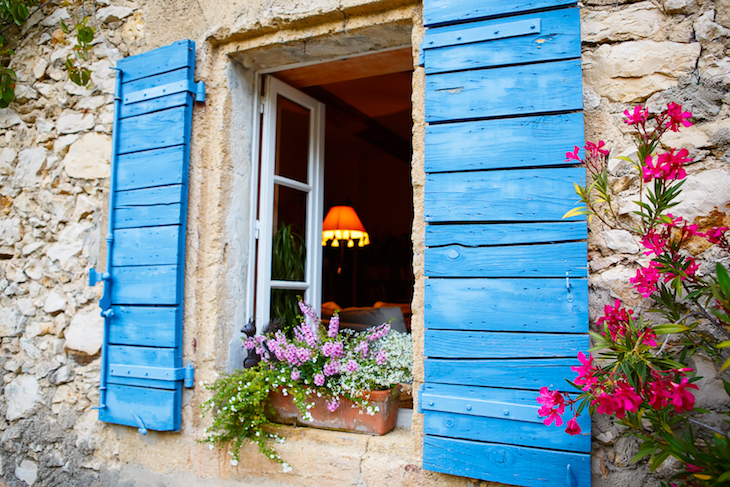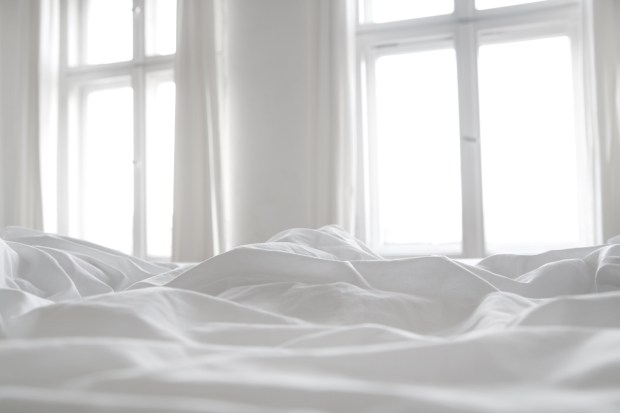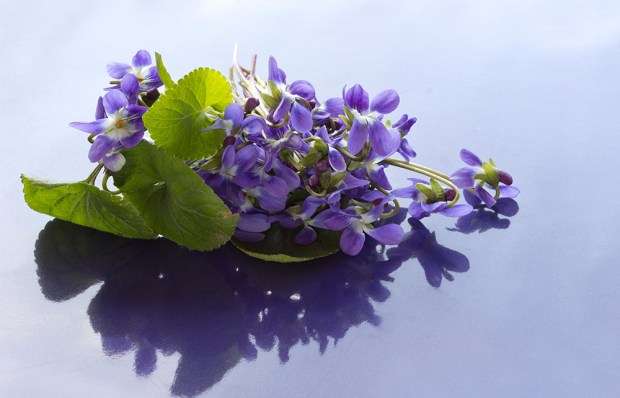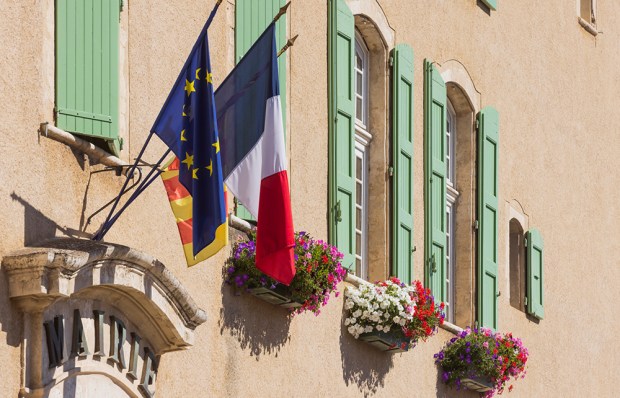During the past three years I have spent quite a bit of time in a rented house in Provence. Volets Bleus is a rectangular breeze-block bungalow perched on the side of a hill. In front of it is a tiled south-facing terrace resting on concrete pillars. The terrace looks over the tops of the trees that grow out of the valley floor, and further out over a commercial vineyard, and then to a distant line of oak-forested hills. Our nearest neighbours are a Dutch couple who live in a pretty old property a quarter of a mile away and high above us, currently on the market for €1.2 million. Kukor and Ezzard refer to our breeze-block shack as ‘the ugliest house in the Var’.
Previously, Volets Bleus was owned by a wealthy Scottish couple who used to drive down from the UK in a chauffeur-driven Rolls-Royce. The chauffeur thought the property beneath his dignity, so while his employers camped out in the house, he stayed in the best local hotel. This unusual state of affairs became a folk memory among the indigenous French. The first question asked by the first local to make a courtesy visit was: ‘Are you Scottish?’ Catriona is in fact Scottish. But she had to disappoint him by going on to say that sadly she was unrelated to the couple with the Rolls-Royce and the haughty chauffeur and that she was only renting.
Catriona lives here all year round; I come and go. I like the house, she doesn’t. Indeed, she has a ready list of grievances for summer visitors who tell her how lovely it must be to live here. In winter she is frozen and in summer she almost boils to death. The roof leaks. The septic tank smells. The stink of putrefying boar corpses in the hunting season is unsupportable. The house is regularly and dramatically infested with millipedes, ladybirds, biting ants and a reputedly edible dormouse called a loir. The scratch scratch scratch of loir in the roof drives Catriona mad. (Loir are protected by French law and impossible to kill, in any case. We’ve tried everything from cage traps to sticky pads to ultrasonic sound. Personally, I am now greatly in favour of these intelligent creatures.)
Sneeze and the electricity trip switch at the bottom of the hill is thrown. Matter from the lavatories occasionally bubbles up into the kitchen sink. The crack in the floor that runs the length of the house, and which seems to suggest that the house might slip down the hill at any moment, grows alarmingly wider. The wood burner is inefficient and smoky. The cupboards are mouldy. And so on and so forth. If pressed for time, she merely characterises the house as hot, cold, damp, leaky, draughty, dusty, mouldy, smelly, smoky and infested.
But her love of the countryside in which the house sits amounts to a sort of pagan idolatry. Forget the house; for Catriona the countryside is everything. The scent of pine or thyme wafting across her nostrils on a hot breeze transports her. In mid-April the first nightingale arrives in the treetops in front of the house, clears its throat and flings its soul out. Over the next week more arrive. Last year four within earshot sang their little heads off day and night for six weeks. The nightingales are so numerous in the district, and they sing so loudly, that people complain about them. They sing even through torrential rain and crashing thunderstorms. If a mistral has blown the atmosphere free of dust, the stars at night are like flung silver pepper. On such nights I will admit that it is pleasant to sit or lie outside with the gin bottle for an evening of low-tech entertainment.
But unlike Catriona, I am sniffy about the Provençal countryside. ‘It’s barren,’ I complain. And so it is. The only vegetation that thrives here, as far as I can see, are spiky things. Before the Romans bought the olive and the vine, the place must have been uninhabitable. There’s no standing or running water. No babbling brooks or placid ponds. There’s no topsoil even, just boulders and sharp-edged rubble. ‘But look!’ she says, pointing at the hills. ‘It’s so green.’ ‘Scrub oaks,’ I spit. ‘Weeds.’ ‘And so quiet!’ she says. I concede ‘quiet’. That’s because they’ve shot all the songbirds except the nightingales. Perhaps their little bones make for fiddly eating.
But there is one truly marvellous thing about Provence on which we agree; about which everyone agrees. You fling back the shutters every morning and it dazzles you. It makes one feel cheerful, sexy and alive. I even suspect that three years of this sunshine is partly responsible for restoring my health. Three years ago the good old NHS ‘threw the kitchen sink’ at my cancer. This uncannily sharp sunshine has, I think, done the rest. I can’t believe my luck.
Got something to add? Join the discussion and comment below.
Get 10 issues for just $10
Subscribe to The Spectator Australia today for the next 10 magazine issues, plus full online access, for just $10.
You might disagree with half of it, but you’ll enjoy reading all of it. Try your first month for free, then just $2 a week for the remainder of your first year.















Comments
Don't miss out
Join the conversation with other Spectator Australia readers. Subscribe to leave a comment.
SUBSCRIBEAlready a subscriber? Log in